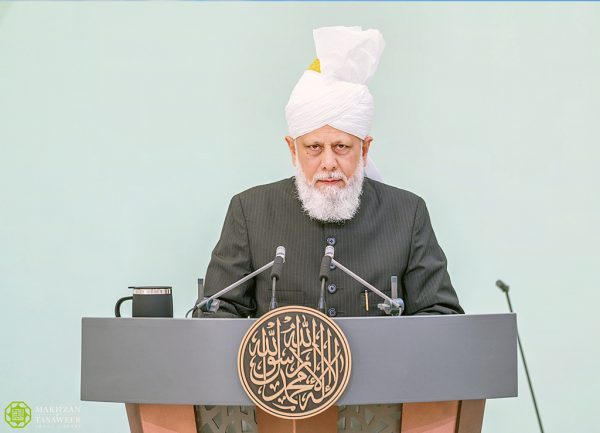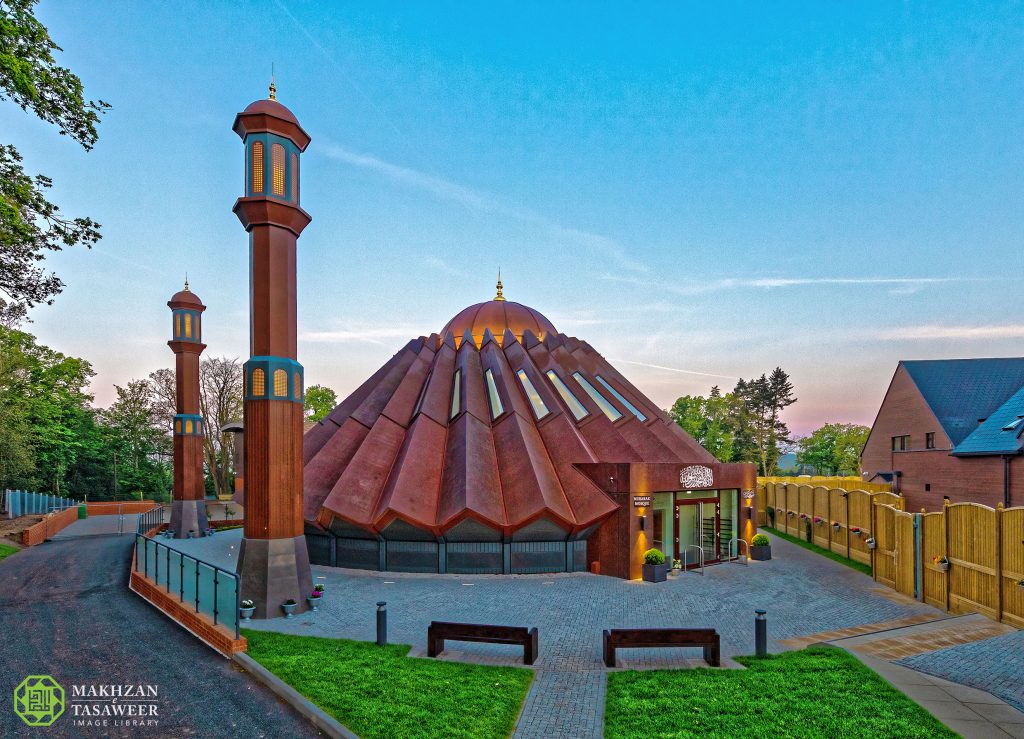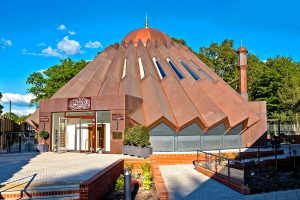After reciting Tashahhud, Ta‘awwuz and Surah al-Fatihah, His Holiness, Hazrat Mirza Masroor Ahmad (aba) said that he was mentioning the martyrdom of Hazrat Khubaib in a particular expedition. It is recorded that he was the first companion to have been killed after being put on a wooden structure, i.e., similar to a cross.

The disbelievers threatened to kill him in this manner, but Hazrat Khubaib (ra) replied that this was of little concern to him, if he were to die in the way of Allah.
His Holiness (aba) continued that Hazrat Khubaib (ra) prayed that the Holy Prophet (sa) be informed of his condition. And so, one day, the same state overcame the Holy Prophet (sa) when he would receive revelation, and he stated, ‘May peace be upon him too, and the mercy and blessings of Allah.’ Thereafter he said that Gabriel (as) had conveyed Hazrat Khubaib’s (ra) message of peace and that the Quraish had killed him.
Severe Treatment of the Quraish Against Hazrat Khubaib (ra)
His Holiness (aba) then said that the Quraish pierced the body of Hazrat Khubaib (ra) as he was on the cross. He then turned his face to the Ka’bah and he was killed. His Holiness (aba) said that it seems from this narration that he was tortured with the spears before being killed. But according to a narration of Sahih al-Bukhari, after Hazrat Khubaib (ra) completed his couplets, Uqbah bin Harith approached him and killed him.
His Holiness (aba) said that Hazrat Mirza Bashir Ahmad (ra) has written in this regard:
‘However, before the heartfelt enmity of the Quraish, emotions of mercy and justice were out of the question. As such, it had not been many days when the people of the Ban Al-Harith and other chieftains of the Quraish took Khubaib (ra) to an open field in order to execute him and celebrate his death. When Khubaib (ra) perceived the fragrance of martyrdom, he implored the Quraish to allow him an opportunity to offer two Rak‘at of salat before his death. The Quraish, who perhaps desired to make the Islamic worship a part of this spectacle, granted him permission. Khubaib (ra) offered two Rak‘at of Salat with great attention and concentration. After completing his Salat, he said to the Quraish, “I desired to prolong my Salat even more, but then I thought that you may assume that I am prolonging my Salat with the intention of deferring death.” Then, reciting the following couplets, Khubaib (ra) leaned forward:
“When I am being martyred in the cause of Islam as a Muslim, I care not as to which flank I fall upon after being martyred, all of this is for the sake of God; And if my God so wills, He shall bless my every severed limb.”
The last words of these couplets were perhaps still echoing from the tongue of Khubaib (ra) when ‘Uqbah bin Harith stepped forward and this lover of the Holy Prophet (sa) was mixed to dust. In another narration it is related that the Quraish hung Khubaib (ra) to the branch of a tree and then murdered him by repeatedly piercing him with lances.’
(Hazrat Mirza Bashir Ahmad (ra), The Life & Character of the Seal of Prophets, pp. 365-366.)
His Holiness (aba) said that Abu Hurairah (ra) has narrated that Hazrat Khubaib (ra) was the first companion to offer two rak’at of prayer before being killed.
Outcome of Hazrat Khubaib’s (ra) Prayer Against the Disbelievers
His Holiness (aba) then quoted Ibn Hajar al-Asqalani who wrote that Hazrat Khubaib (ra) prayed, ‘O Allah, count my enemies so that revenge can be exacted on them.’ In another narration further words are recorded as follows, ‘Kill them all one by one and do not let any of them remain.’
When the disbelievers heard this prayer, some of them fell to the ground in fear. Not even a year passed when all except those who fell to the ground had died as a result of this prayer. His Holiness (aba) said that this claim cannot be substantiated through other narrations, but it can be said that the majority of them were either killed or accepted Islam at the time of the Conquest of Makkah, thus fulfilling the prayer of Hazrat Khubaib (ra).
His Holiness (aba) said that one biographer has written that when this prayer of Hazrat Khubaib (ra) was heard by the disbelievers, they were struck with fear, knowing it would be fulfilled. So some of them covered their ears and fled, whilst others hid behind one other, climbed up trees or lay on the ground, hoping they would be saved from the prayer.
His Holiness (aba) said that of those disbelievers who accepted Islam later, they would at times lose consciousness or be struck with awe whenever Hazrat Khubaib’s name was mentioned.
Group of Companions Sent to Retrieve the Corpse of Hazrat Khubaib (ra)
His Holiness (aba) said that in one narration it is mentioned that the Quraish appointed 40 people to guard the body of Hazrat Khubaib (ra) after he was put on the cross. 40 days later, the Holy Prophet (sa) sent Hazrat Miqdad (ra) and Hazrat Zubair bin Awwam (ra) to Makkah to take down his body from the cross. When they reached, they found the 40 people in deep sleep. They thus took the body down and placed it on their horse as they departed. When the disbelievers found out, they sent 70 people to apprehend them. As they drew close, Hazrat Zubair (ra) placed the body on the ground and said to the disbelievers that if they so willed, they could face them and be killed, or return safely. This caused so much awe in their hearts that they returned unsuccessful. But as Hazrat Zubair (ra) looked down to find the body, it was as if it had been swallowed by the ground, giving Hazrat Khubaib (ra) the title ‘The one swallowed by the ground.’
His Holiness (aba) said that there are several strange narrations as to how it disappeared, but one of them seems to be correct, which states that his body fell into the river and was taken downstream. In any case, Allah Almighty safeguarded his body from the hands of the disbelievers. He protects those who love Him and sacrifice everything for His cause, even after death.
His Holiness (aba) said that this brings mention of this expedition to an end.

Appeal for Prayers
His Holiness (aba) said to continue praying for the Palestinians as the situation has crossed all bounds. The USA previously said that going into Rafah was their red line, but now say it isn’t, and no one knows what their red line truly is. He prayed that Allah Almighty grants the innocent protection from these oppressors.
Similarly, pray for the people of Sudan where they are killing their own people and Muslims are killing Muslims. May Allah grant them understanding and enable them to truly act upon the teachings of Islam.
His Holiness (aba) said to continue to pray for those imprisoned in Yemen that they may be released. Pray also for the Ahmadis in Pakistan, where, as Eid is approaching, the clerics are intensifying their efforts against the Community. May Allah protect all the Ahmadis from their mischief and grant the means to the release of the prisoners there.
Funeral Prayers
His Holiness (aba) said that he would then lead funeral prayers in absentia.
Chaudhary Munir Ahmad Sahib
The first is of Missionary Chaudhary Munir Ahmad Sahib, former Director of MTA Teleport America. He passed away a few days ago at the age of 73. ‘Verily to Allah we belong and to Him shall we return.’ His family entered the fold of Ahmadiyyat through his great-grandfather Hazrat Maulvi Fazal Din Sahib, who was listed as number 2 of the 313 companions of the Promised Messiah (as).
Chaudhary Munir Ahmad Sahib graduated from Jamia in 1973 and served as a missionary in various parts of Pakistan. In 1981, he was sent to the US. He played a vital role in establishing the MTA teleport and was later appointed its director. He did not have any proper qualifications for this task, but he had a passion for it and worked tirelessly.
He is survived by his wife, daughter and son. His children wrote that he always placed his trust in Allah and turned to God in times of difficulty. He was very hospitable, had a deep bound of love for Khilafat, and always utilised his skills to serve in MTA. He not only helped in his own department, but would support other departments and cooperate in any way possible when required of him.
His Holiness (aba) said that many people wrote that Chaudhary Sahib always strived his best to follow the instructions of the Caliph of the time.
If ever any missionary complained to him about being placed in an office after 7 years of studying to become a missionary, he would reply that the Caliph knows best where to appoint them, and that if he was instructed to merely sweep the floor, he would do so wholeheartedly. His Holiness (aba) said that Hazrat Musleh Maud (ra) once said that there will come a time when we will need the missionaries to work in the offices also, rather than having other clerical staff. Therefore, all missionaries should remove the thought of why they are serving in any given capacity, and that they can be appointed in any capacity at any given time.
His Holiness (aba) said that Chaudhary Sahib worked very meticulously and served in MTA for 29 years. It is due to his efforts that we now have MTA North America and MTA South America.
His Holiness (aba) said that he always tried to save the Community’s costs and only acquired machinery that was absolutely necessary. He worked very humbly and fulfilled his Waqf excellently. His Holiness (aba) prayed that may Allah grant the deceased forgiveness and mercy and elevate his rank.
Abdur Rahman Kathi Sahib
The second funeral prayer is of Abdur Rahman Kathi Sahib, who passed away a few days ago. ‘Verily to Allah we belong and to Him shall we return.’ He was a Musi and pledged his allegiance at the age of 16. He was regular in offering his prayers and fasting. He was humble and pious-natured.
His son writes that he always taught them to give precedence to their faith and would send them to a faith school for an hour or two before going to the state school, and made sure every night that they had recited the Qur’an. His wife had passed away three years ago, so he is survived by his two daughters and four sons. One of his sons is Shamsuddin Malabari Sahib, who is serving as the missionary-in-charge in Kababir, was unable to attend the funeral. His Holiness (aba) prayed that Allah Almighty grants him patience and forbearance, elevates the rank of the deceased, and grants his forgiveness and mercy.
Summary prepared by The Review of Religions




Add Comment